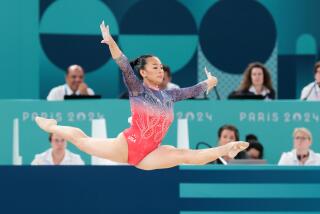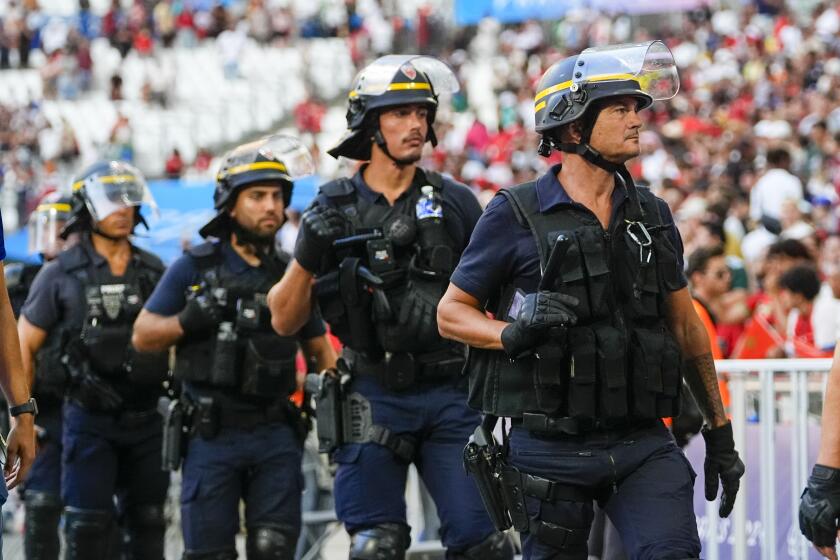If Team USA doesn’t succeed at Winter Games, will it blame Canada?
U.S. Olympic officials have one thing they would like to say to our neighbors from the Great White North.
Whoa, Canada.
The pace at which Canada’s “Own the Podium” program has improved the country’s winter sports results in anticipation of the Vancouver Olympics will almost certainly halt Team USA’s recent rise toward the top of the Winter Games medal count.
But, almost paradoxically, the United States can count on medal possibilities in more sports than ever before.
In fact, ski jumping is the lone discipline among the 15 being contested here in which the United States does not have a snowball’s chance in this unseasonably warm weather of winning a medal.
“We expect to have the Canadians in a very strong position,” said Mike English, in his first Olympics as USOC director of sport performance. “[But] breakout results in some sports add a lot of opportunities for Team USA to be in contention.”
With three strong Nordic combined athletes, two of whom won individual world titles last year, the U.S. should win its first medal in the sport that combines ski jumping and cross-country skiing.
Team USA also has a chance at a first-ever biathlon medal, a first women’s cross-country medal and the first men’s bobsled gold medal since 1948.
Of course, the last time the United States had a contender in biathlon, Josh Thompson at the 1988 Olympics, Thompson was so undone by expectations that he fled the media like a frightened deer after finishing 25th in his first race.
USA Biathlon Executive Director Max Cobb saw the latest hope, Tim Burke, have his performance level drop after he became the first U.S. man ever to wear the World Cup leader’s jersey earlier this season.
“That created a kind of pressure he wasn’t accustomed to, and a new dynamic,” Cobb said. “He physically is still really fit, and the down time before the Games will get him back at ease.”
Because winter sports are not in the DNA of most U.S. sports fans, the external pressure on the athletes generally is minimal. That does not prevent them from feeling great internal stress to succeed.
And the U.S. has enjoyed tremendous success in the last two Olympics, spurred by having the Winter Games at Salt Lake City in 2002.
After finishing sixth in the overall medal count with 13 at Nagano, Japan, in 1998, a performance relatively equal to those of the four preceding Winter Games, the U.S. won 34 in 2002 and 25 in 2006, finishing second to Germany both times.
Canada has also made a leap, from 13 medals in 1994 to 24 at Turin, Italy, in 2006.
Both countries are strong in many of the same events, meaning they will be fighting for the same medals. That has led to charges that Canadian sports officials were limiting U.S. athletes’ training time at Vancouver competition venues, so the home team would have an advantage.
That is especially important on the Whistler sledding track, where repeated experience on the course is critical.
“There certainly is a home-ice advantage, especially on a difficult track like this is,” said USA Bobsled & Skeleton boss Darrin Steele.
“But it kind of evens the playing field when you have a new track everyone has limited runs on, with the exception of the Canadians, who certainly are going to be pretty tough up there. As for looking at this as an unfair advantage, we really don’t.”
A Latvian bobsled team (95.08 mph) and German luger Felix Loch (95.68) both posted world-record speeds on the Whistler track last year.
“There is no team in the world that wouldn’t have wanted to get additional time,” USA Luge Executive Director Ron Rossi said. “Yes, this was a courtesy granted to the Canadians prior to 2002. No, it was not granted to us.”
After he helped USA Speedskating fill a $300,000 hole in its budget, comedian Stephen Colbert accused the Canadians of being “ice holes” after U.S. speedskaters complained about how little time they got on the Olympic Oval.
Canadian officials since decided to open the venue a few days earlier than planned to foreign teams for pre-Olympic training.
USOC leaders decline to make medal predictions.
“It’s important for our nation to have its athletes perform up to expectations,” English said. “From where we had been in years past, we are in a great position.”
More to Read
Go beyond the scoreboard
Get the latest on L.A.'s teams in the daily Sports Report newsletter.
You may occasionally receive promotional content from the Los Angeles Times.






